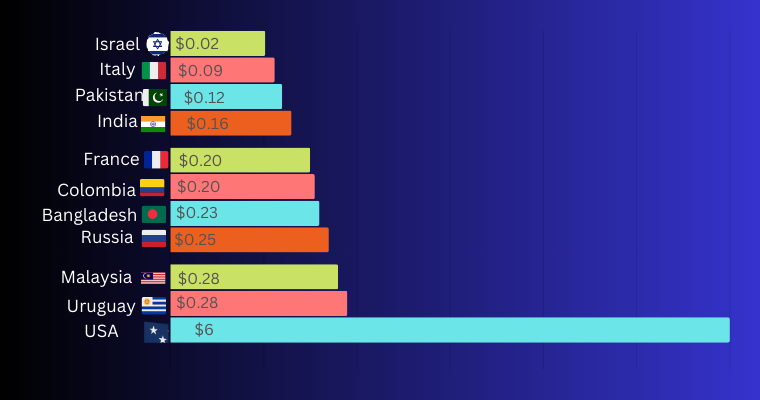Top 10 Countries with the Cheapest Mobile Data
Top 10 Cheapest Mobile Data Countries
The World’s Most Affordable Mobile Data: A Tour Across the Top 10 Countries
Introduction
Mobile data is essential for daily living and entertainment, making it affordable and accessible. here is analyzed data from over 5,000 plans across 200 countries to find the cheapest mobile data country in the world, calculating the average cost of one gigabyte (1GB).
Hey there, fellow data enthusiasts! Ever wondered where on this vast planet you could snag yourself the cheapest mobile data countries? Imagine being able to stream, browse, and upload without the constant worry of running out of data or, worse, emptying your wallet. Well, dream no more because we’re about to embark on a digital journey across the globe to discover the top 10 countries where mobile data won’t break the bank. Buckle up!
Exploring the Importance of Mobile Data Affordability
In today’s connected world, mobile data is as essential as the air we breathe (well, almost!). It powers our digital lives, keeping us in touch with loved ones, informed about global events, and entertained on the go. But, when the costs rack up, it can feel more like a luxury than a necessity. That’s why finding affordable mobile data options is crucial for fostering inclusivity and connectivity for everyone, everywhere.
Global Mobile Data Trends: A Quick Overview
As we dive into the data ocean, it’s interesting to note that mobile data costs vary wildly across the globe. Factors like infrastructure, competition among providers, and governmental policies play massive roles in determining prices. Let’s explore how these elements blend to create the mobile data cost landscape worldwide.
Criteria for Ranking: How We Identified the Cheapest Mobile Data Countries
Our digital expedition follows a map drawn using the average cost per gigabyte (GB) in each country, focusing on publicly available data, consumer reports, and insights from mobile data providers. This gave us a clear path to identifying where consumers enjoy the most affordable mobile data.
The Countdown Begins: Countries with the 10th to 6th Mobile Data Cheapest Country
10th Place: Uruguay: $0.28 Overview and Key Insights
- Mobile Data Infrastructure: Uruguay boasts an impressive network, thanks to early investments in broadband and mobile technologies.
- Average Cost per GB: At just $0.28, it’s a haven for data users.
- Contributing Factors to Its Ranking: The country’s forward-thinking digital policies and small geographic size make it easier to cover with high-speed mobile services.
9th Place: Malaysia: $0.28 Overview and Key Insights
- Mobile Data Infrastructure: With its mix of urban and rural landscapes, Malaysia has focused on expanding its mobile networks to reach every corner.
- Average Cost per GB: Matching Uruguay’s $0.28, Malaysia offers great value.
- Contributing Factors to Its Ranking: Governmental efforts to increase competition among mobile providers have driven prices down.
8th Place: Russia: $0.25 Snapshots of Affordability
- Brief Overview of Each Country: Russia’s vast landmass is covered by a comprehensive mobile network.
- Comparative Costs and Factors: At $0.25 per GB, extensive infrastructure and high competition among giants keep costs low.
- Why These Countries Stand Out: Russia’s blend of technology and policy ensures affordability.
7th Place: Bangladesh: $0.23
- Brief Overview of Each Country: With a high population density, Bangladesh has capitalized on mobile data as a primary internet access point.
- Comparative Costs and Factors: The competitive price of $0.23 per GB is a result of intense market competition.
- Why These Countries Stand Out: Its focus on mobile-first infrastructure drives costs down.
6th Place: Colombia: $0.20 per GB
- Brief Overview of Each Country: Colombia’s diverse terrain has not hindered its commitment to mobile data expansion.
- Comparative Costs and Factors: Standing at $0.20 per GB, the country’s competitive marketplace and rising mobile penetration rate contribute to low costs.
- Why These Countries Stand Out: Governmental support for innovation in mobile services makes it a standout.
Top 5 Countries: Where Data Costs the Least
5th Place: France: $0.20 Pioneering Affordable Connectivity
- Revolutionary Mobile Data Policies: France’s approach to digital inclusivity involves heavy regulation and competition encouragement.
- Average Cost: A Closer Look: Matching Colombia at $0.20 per GB, it’s a testament to effective policy.
- The Impact on Local Populations: Affordable data drives digital literacy and connectivity, enhancing daily life.
4th Place: India: $0.16 Setting Global Benchmarks
- Innovations in Mobile Technology: The rapid adoption of mobile-first solutions and fierce competition keep prices incredibly low.
- How the Pricing Is Achieved: At $0.16 per GB, extensive network coverage and a vast user base spread cost thinly.
- Benefits to the Economy and Consumers: Low-cost data fuels digital transformation and economic growth.
3rd Place: Pakistan: $0.12 The Surprising Contender
- Unique Factors Driving Costs Down: Intense market competition and government subsidies have led to dramatically low prices.
- Community and Government Roles: Collaborative efforts between the public and private sectors are key.
- Future Prospects for Even Lower Costs: Ongoing investments in mobile infrastructure promise even cheaper data.
2nd Place: Italy: $0.09 The Silver Medal of Mobile Data Affordability
- A Leap in Mobile Data Accessibility: Italy’s competitive mobile market and regulatory frameworks make it a leader in affordability.
- The Role of Competition and Regulation: These forces drive down prices while ensuring quality services.
- The Broader Impact on Internet Usage: Low-cost mobile data has skyrocketed internet penetration and usage.
1st Place: Israel: $0.02 The World’s Cheapest Mobile Data
- How They Achieved This Status: Aggressive competition, regulatory support, and technological innovation set Israel apart.
- The Backbone of Their Mobile Data Success: A small geographic area combined with high-tech infrastructure facilitates remarkable coverage.
- What Others Can Learn From Them: Israel’s model shows the potential of policy and technology in harmony.
Comparative Analysis and Global Implications
“The quest for affordable mobile data is not just about saving a few bucks; it’s about opening doors to the digital world for everyone.”
The cost of mobile data significantly affects internet accessibility and usage. Countries with lower prices tend to have higher internet utilization rates, demonstrating the critical role of affordable data in digital inclusivity. Governments and the private sector can take a leaf from the book of our top 10 countries by promoting competition, investing in infrastructure, and crafting policies aimed at reducing costs.
Predictions for the Future: Can Others Replicate This Success?
As technology evolves, there’s hope that more countries will join the ranks of those offering cheap mobile data. By learning from these examples, nations can foster environments where affordable connectivity becomes a reality for all.
Conclusion and Key Takeaways
Embarking on this global tour of affordable mobile data has not only highlighted the champions of cheap connectivity but also underscored the importance of accessibility in our increasingly digital lives. Affordable data is a foundation of global development, enabling education, business, and social inclusion on unusual scales. As we look ahead, let’s champion the cause for more affordable data, imagining a world where everyone can freely connect, share, and grow.
FAQs: Understanding the Basics and Beyond
Mobile data allows internet access via mobile networks. Its cost directly impacts digital accessibility and inclusion.
The average cost per GB is determined by dividing the total monthly cost by the total data consumed in that month.
Absolutely! Policies aiming at promoting competition and infrastructure investment can lead to lower prices.
Affordable data boosts internet usage, opening up opportunities for education, business, and social engagement.
Investing in infrastructure, encouraging competition, and implementing supportive policies are key steps.

